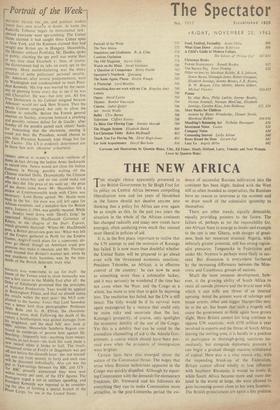— Portrait of the Week SECURITY FILLED THE AIR, and political
leaders found their own security in doubt. At home the Radcliffe Tribunal began its monumental task: abroad everyone went spy-catching. The United States claimed it had caught three Cuban spies in New York, and the Russians claimed they had caught one British spy in Hungary. Meanwhile, the Minister without Portfolio, Mr. Deedes, spoke in public, claiming the spy peril was worse than at any time since Elizabeth I: then, of course, the Government had its tabs on every spy in the country. More world-shattering was the shaky structure of some politicians' personal security. Dr. Adenauer, after several postponements, went to Washington and condescended to meet Presi- dent Kennedy. His trip was marred by the neces- sity of phoning home every day to see if he was still Chancellor. He was—but only just. All five Free Democrats in his Cabinet resigned because Adenauer would not sack Herr Strauss. Then the whole Cabinet resigned, but only to allow the Doctor to reshuffle. Before the French general election on Sunday, everyone forecast a crushing and possibly ruinous defeat for de Gaulle: after Sunday all the pundits patted each others' backs for forecasting that the electorate, sensing it could not beat the President, would choose to join him. President Kennedy kept things hot for Dr. Castro: The US is evidently determined not to leave him with 'offensive' armaments.
Tlislics APPEAR IN NEHRU'S AR MOLIR—IIIIIIILIS of them, in fact. driving the Indian Army backwards in record time Nehru would not close the Indian Embassy in Peking. possibly waiting till the Chinese reached Delhi. Dramatically the Chinese offered a cease-fire, and no one could make out Why they did. The price of tea went up: the price of tea shares came down. Mr. Macmillan felt a review of Commonwealth trade with China was necessary : Lord Home agreed. Mr. Heath went back to the Six : the door was still left open for African countries. and a tentative date for British entry, January 1. 1964. was quietly mooted. While Mr. Sandys went down with 'Devil's Grip.' he appointed Malcolm MacDonald Governor of. Kenya, to the chagrin of the Daily,' Express, Which gloomily declared: 'Where Mr. MacDonald goes, a British possession goes too.' What was left of the Empire gathered in Perth for the Empire Games. Anglo-French plans for a supersonic air- liner go ahead, though an American crash pro- gramme may make it obsolete, and Mr. Thorney- croft insisted that Britain's nuclear test. while by any standards truly harmless, was, by the stan- dards of the British deterrent, truly vital.
ROYALTY HAD SOMETHING to say for itself : the Imam of the Yemen tried to show monarchy was not a lost cause in the Middle East after all: the Duke of Edinburgh promised that the principles Of National Productivity Year would be applied in Buckingham Palace, and that we should notice the results within the next yew: the NUJ com- plained to the Sunday 7 rmes that Lord Snowdon was a better lord than photographer. Professor Niels Bohr and G. H. Elliott, the chocolate- coloured coon, died. Following the death of his canary a Southampton man gained damages from IT neighbour, and the dead NIC may look at MPs' salaries. Meanwhile Southern Region con- tinued its campaign of passive hate against Dr.
minutes frequently late—anything from twenty
mn Mutes tO two hours—his train this week made a record when it broke in half. The much- threatened strike at Ford's of Dagenham was put it__ just before the eleventh hour : the 'not wanted' 1%1\1 was cut from seventy to forty and each case 11 be discussed individually. Also cut was the PP in Tam-ratings between the BBC and ITV:
Within twenty per cent, of the ITV figures. The
-r Pentagon urged a cut in military spending, and !'esident Kennedy was reported to be consider- ing the idea of forming a special branch of the Peace ace Corps, for use in the United States.










































































 Previous page
Previous page